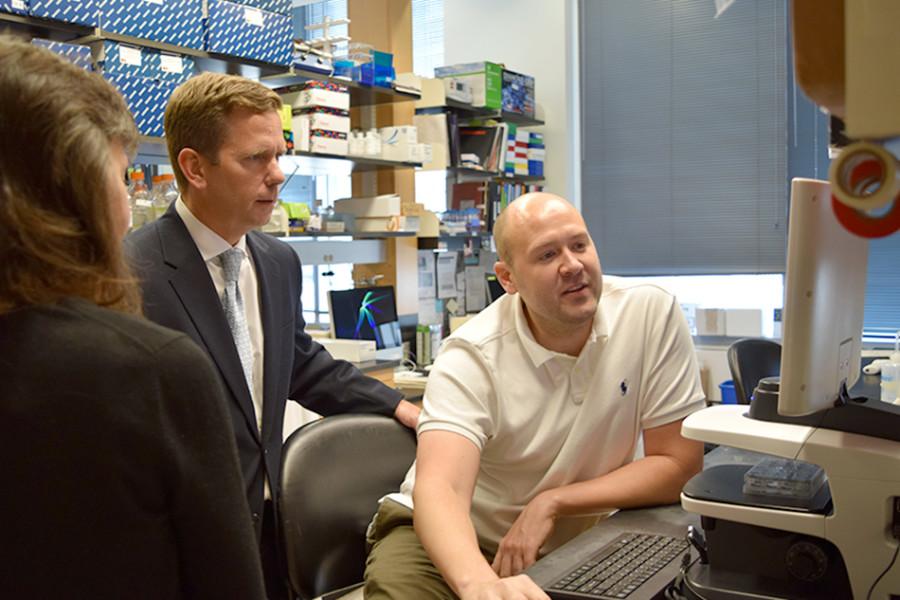Rep. Bob Dold talks medical research funding bill with NU faculty
Julia Jacobs/Daily Senior Staffer
Rep. Bob Dold (center) views stem cells transformed into live heart cells under a microscope in Feinberg School of Medicine’s Center for Genetic Medicine. Dold toured the lab Monday before a roundtable discussion with NU doctors and administrators on medical research funding.
August 31, 2015
U.S. Rep. Bob Dold (R-Ill.) toured a Feinberg School of Medicine genetics laboratory Monday, then spoke with Feinberg doctors and administrators about the need for more federal funding for medical research.
“We spent a little over 330 billion dollars this year in treating diabetes alone,” Dold said. “Can we get some research dollars to see if we can cure it? Because, heaven knows, we can use the 330 billion dollars in another way.”
Visiting the Chicago Campus, Dold sought support from the medical professionals for passage of the 21st Century Cures Act, a federal bill aimed at increasing funding for the National Institutes of Health and the Food and Drug Administration as well as streamlining the clinical trial process. The bill, which Dold co-sponsored, passed the House in July with bipartisan support and now awaits approval in the Senate.
The pending medical research bill would funnel $1.75 billion per year for five years into the NIH and $110 million per year to the FDA in the same time period. The bill would also establish incentives such as a loan repayment program meant to attract young scientists to the U.S., an issue for which both Dold and the Feinberg faculty expressed interest.
“It also provides much-needed resources to enable the research staff to try to attract some of the best and the brightest to be here,” Dold said. “As we look at the global economy, as we look at where people are investing research dollars, we are no longer unequivocally the top.”
Dr. Al George, the chair of Feinberg’s pharmacology department, said the current dearth of medical research funding could result in losing young scientists to different fields.
“It is about funding and opportunities to invest in people who have shown promise,” George said. “We need to make sure we’re not losing them to other careers that may have a less transformative effect.”
NU faculty expressed to Dold concerns about Feinberg researchers spending excessive time fulfilling administrative requirements instead of doing substantive scientific work — for example, scientists are often required to complete a safety training at each institution where they work during their research careers, said Jay Walsh, the vice president for research at NU. Making that safety certification universal among colleges and universities would remove a barrier to making medical discoveries, Walsh said.
On a national level, the medical research bill attempts to expedite the clinical trial process by reducing these administrative demands — shortcuts the former FDA commissioner Dr. David Kessler opposed in an op-ed in The New York Times as potentially dangerous.
Although the Monday meeting focused largely on points of agreement between the doctors, administrators and Dold on increasing federal funding to medical research, some researchers expressed frustration with effect of Washington gridlock on scientific progress.
Dr. Dimitri Krainc, chair of Feinberg’s neurology department, told Dold that politics in Washington can be an obstacle to doctors fulfilling their first priority of taking care of patients. In response, Dold pointed back to the medical research bill as a demonstration of bipartisan cooperation.
The bill also makes an attempt to personalize the patient treatment process by regulating the use of biomarkers, which are used to assess a treatment effect on a patient earlier, as well as incorporating patient experience into the clinical trial process.
“(Patients) don’t care about political problems, they don’t care about funding problems,” Krainc said to Dold. “They’re waiting for us to come together and find a solution for them.”
Email: juliajacobs2018@u.northwestern.edu
Twitter: @juliarebeccaj


